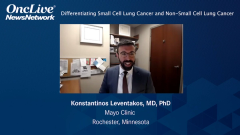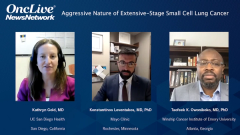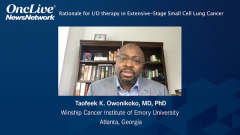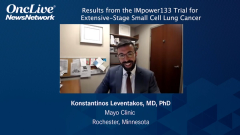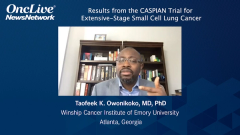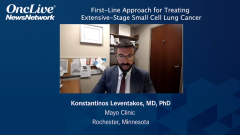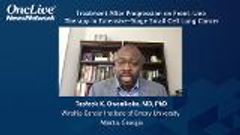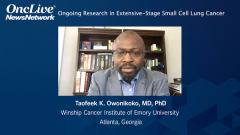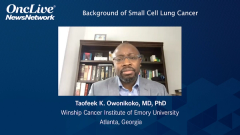
Advances in Extensive-Stage Small Cell Lung Cancer
Episodes in this series

Kathryn Gold, MD: Could you comment on the recent advances in extensive-stage small cell lung cancer, now with the availability of several checkpoint inhibitor/chemotherapy combinations? Is that your standard of care?
Taofeek K. Owonikoko, MD, PhD: The combination of immunotherapy and chemotherapy has become the standard of care for front-line therapy of extensive-stage disease, at least here in the United States, and I would say that will probably be the case all over the world soon. Not only do we have well-conducted prospective trials showing benefit of adding checkpoint inhibitors to chemotherapy, but now we’ve had 4 well-conducted trials showing definitive evidence that adding immunotherapy to chemotherapy is beneficial or, at worst, showing a trend because 1 of the studies did not meet the statistical significance.
In terms of the recent advances, we added only anti-CTLA4 to chemotherapy for the initial step, and that did not result in improved outcome. Adding anti–PD-L1, specifically the anti–PD-L1 inhibitors durvalumab and atezolizumab, to chemotherapy is now a standard option for treating patients, supported by well-conducted, randomized phase 3 trials. We also know that the addition of nivolumab to chemotherapy showed the same strong signal in terms of progression-free and overall survival. That was a smaller study, so it wasn’t a definitive randomized phase 3 trial. Lastly, the addition of pembrolizumab to chemotherapy also outperformed chemotherapy alone, with significant improvement in terms of progression-free survival; there was a strong trend that did not meet statistical threshold in terms of overall survival. We have these—not just 1 study, but 4 studies—all pointing in the same direction and telling us that this is the right strategy to adopt when we treat our patients.
The only reason why I would not use a checkpoint inhibitor along with chemotherapy for somebody with a diagnosis of extensive-stage disease is because they cannot get chemotherapy. If they have problems that would make chemotherapy prohibitively toxic, that would be the only reason why I would not give them the immune checkpoint blockade along with it.
That brings up the other question: What is the role of immunotherapy itself when we compare how we use it in small cell to non–small cell lung cancer? We all recognize that we have different ways of using checkpoint blockade when it comes to non–small cell lung cancer. We can use it alone if you have evidence of PD-L1 expression, whether low or high and depending on patient status. You can use it in combination with chemotherapy for the entire duration of the induction phase, or we can use this combination immunotherapy by itself. With more recent data, you can even do abbreviated chemotherapy along with immunotherapy and then continue with immunotherapy.
For small cell lung cancer in the front-line setting, we have only 1 option of doing this, and that is in combination with chemotherapy. My own impression of why we have stuck with this goes back to what I said earlier, which is that for a large proportion of patients with small cell lung cancer, when you look at the tumor samples under the microscope, they are very cold immunologically. Relying on immunotherapy alone will require us to understand the biology of small cell [lung cancer] better and be able to identify the small proportion of patients where you could make a case for testing immunotherapy by itself, but I don’t think we’re anywhere near there right now.
Transcript Edited for Clarity


